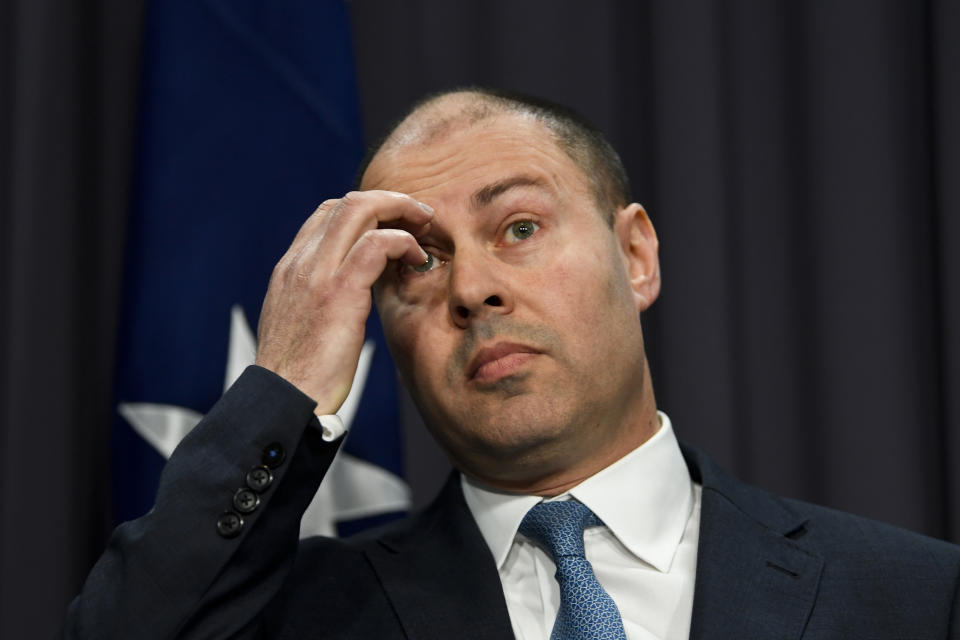OPINION: How the Treasurer risks trashing the Coalition's economic credibility

Treasurer Josh Frydenberg has a huge budget problem. He also has a huge economic problem.
And this is all of his own making by preferring a budget surplus over economic and jobs growth.
The problem has the potential to smash the economic management credibility of the Coalition government.
In the Mid Year Economic and Fiscal Outlook this week, the budget surplus estimates for the four years 2019-20 to 2022-23 were scaled back in part because the economy was weaker than assumed at the time of the April 2019 budget and because the government has spent a little bit more in relation to the drought and some infrastructure projects.
The latest from The Kouk: OPINION | The RBA's policy: 'Do nothing and hope for the best'
More from The Kouk: ‘Utterly desperate’: Why Scott Morrison wants you to ignore government debt
More from The Kouk: An open letter to Treasurer Josh Frydenberg
The budget surplus forecasts in MYEFO are:
2019-20: $5.0 billion
2020-21: $6.1 billion
2021-22: $8.4 billion
2022-23: $4.0 billion
Note that annual GDP in Australia will be in excess of $2 trillion in 2019-20 which means these are small surpluses – well under 0.5 per cent of GDP.
They are subject to significant revision depending on the strength of GDP, employment, wages, company profits and commodity prices, as well as potential spending decisions that will be taken over the next few years.
This brings us to the vulnerability of the government and risk that it will not only continue to be presiding over a weak economy with rising unemployment, but it may be doing so with the budget cascading back into deficit.
The MYEFO surplus numbers are predicated on the rate of economic growth accelerating from now and staying at that stronger pace over the next four years. As a result, employment growth is forecast to remain buoyant and wages growth are assumed to be moving higher.
There are questions whether this rosy economic outlook will prevail. The RBA has increasing doubts as it highlighted in the Minutes of it December Board meeting.
We all hope things pan out for the economy on the strong side. But if there are any downsides to the economy outlook, from any source, the budget could easily slide into deficit.
Here is the government’s problem.
If the economy is weaker and this results in a lower budget surplus, or perhaps even turns them in to budget deficits, Mr Frydenberg will be floundering for reasons why his economic policy strategy is in tatters.
That is clearly a political problem.
Worse, there will be an economic problem and a cost to voters with higher unemployment, weak wages and soggy economic growth all impact on people’s well-being and confidence.
In these circumstances, if Mr Frydenberg tries to hold on to the budget surplus by restricting government spending or further tightening taxes, an already weak economy will be knee-capped by a fiscal policy tightening just when the opposite is needed.
Fiscal austerity, in this instance, would be the wrong policy at the wrong time.
But even without that scenario, Mr Frydenberg will be hoping that the economic and market forecasts underpinning the MYEFO numbers are correct. These are essential if his small surpluses are to prevail.
If there is any undershooting of the forecasts, it means that when Mr Frydenberg hands down the 2020-21 Budget on the evening of 12 May 2020, he will present a scenario of deficits and weak economic conditions.
Ouch!
It is the sort of double whammy that would crunch the Coalition’s economic management credentials into the dirt.
Worse than that, it would mean the budget surplus obsession of the Coalition will have cost Australia billions of dollars of economic growth, tens of thousands of jobs, decent wages increases and a loss of business investment.
The next few months of the economy will be more interesting than usual. Mr Frydenberg will be hoping people go out and spend. If not, he may well be floundering on budget night when he delivers an economic framework that next to no one will properly endorse.

 Yahoo Finance
Yahoo Finance 
